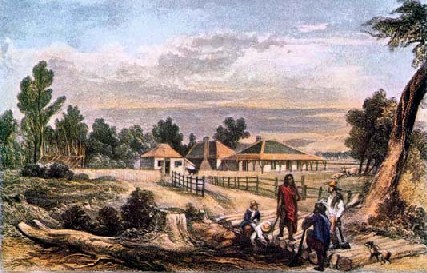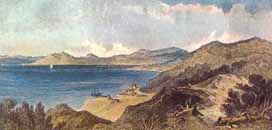|
The settlers in New Zealand are kept in total darkness with regard to the Company's future operations. They, however, have a right to know, for "upon the supposition of their deep interest in this community, they are intrusted with the performance of many of the most important functions of government ; we have a right to expect that there should be at least as much publicity given to their measures as to those of the Government itself. And we cannot but believe that this is the intention of the Directors."
 |
And the Colonist adds on another occasion : - "We do not seek to disguise our conviction, that hitherto, from whatever cause, there has been a degree of inactivity on the part of the Company unfortunate, and perhaps even culpable, by which the progress of the colony has been retarded, and by which the ultimate gain of the Company may be seriously affected. To whom this inactivity is attributable we do not know, and we do not now care to inquire. It may be that the principal agent of the Company has been fettered by instructions which he has had no power to surpass. |
Should such be the case, he ought, more than any individual, to rejoice in a demonstration of opinion which may aid the effect of his suggestions, should he have made such, by convincing the Directors that something more is expected of them than they have yet accomplished, and by giving some reasons for believing that their profits are involved in our prosperity. We do not expect any contributions in aid of this colony, which shall not have a tendency, direct or remote, to increase the value of the Company's property. But we believe that such works as we have indicated (roads) would have this effect. Rightly understood, the interests of the colony and of the Company are inseparable. We cannot prosper without increasing, nor fail without destroying, the source of their future gains. Nor can they do anything in this district for their own benefit which shall not advance our interests; while our progress would receive a serious, and possibly a fatal check, from the cessation of their operations.
"Upon every account, therefore, we have the strongest reasons for desiring their prosperity ; but we certainly shall not seek to evince our concern for their welfare, either by concealing what appears to us a well-founded dissatisfaction, or by neglecting to point out any means by which their and our interests may be advanced."
To which the Gazette replies, with a threat calculated, in its opinion, to silence all further remonstrance, that "there is nothing to prevent them (the Company), as soon as the land sold at Port Nicholson is surveyed, from choosing the remainder of their grant in some remote district, and transferring their head quarters to some other place."
"Nothing to prevent them! We should be sorry to think as meanly of the men who have the direction of the affairs of the New Zealand Company as this statement would imply. Are their promises to us, the settlers in their 'first and principal settlement,' nothing? Are we to assume that they have forgotten the degree in which their success has been influenced by our labours, and that they would deny or disregard the obligation thus imposed upon them to maintain us in the position which they had themselves marked out for us? Nothing to prevent them! We believe that there is everything to prevent them which can restrain men of honour from violating their pledges; which can impel men of principle to discharge a debt of gratitude; and more, which can prevent men of business from abandoning their surest source of profit." (footnote 1)
We are decidedly averse to a system of emigration conducted by Joint Stock Companies, for all experience goes to prove that profit is their first consideration, public utility the last. It matters not what names stand in the direction; to job and trade in colonization is the express object of such associations, and a goodly "dividend" the end constantly in view. Among the shareholders of the Company, there may be individuals who, in purity of motives, yield to none in the land. With these, a regard to the welfare of others, rather than gain, induced them to purchase emigration stock. Still, in practice, we too often find that "Boards" are but screens the individual malpractices and "Directors" an oligarchy to defend "Boards."
It is a known fact that a body of honourable men (and the Directors of the New Zealand Company are "all honourable men") will do that in their collective capacity which, individually, they would be ashamed of. Now it would appear that this wealthy and highly influential body are held in leading-strings by a few of their own number. At times an evident stagnation of business is remarked at the New Zealand House. We inquire the cause, and find that Mr. G. Wakefield has gone to Canada; or perhaps an answer to some application is delayed until Mr. Secretary Ward's return from Germany, where be has been negotiating the sale of a Crown dependency in the name of the New Zealand Company, but, strange to say, without their knowledge.
No, if emigration is to be national, let it be conducted by Government, who will manage its details for less than 25 per cent., a sum exacted by the New Zealand Company as commission for disposing of the land fund.
This Company have sent emigrants to New Zealand, and spent much money in surveys. This they have done, but nothing more. To colonize a country means to subdue it ; to extend civilization through it by means of roads, bridges, ferries, and the like. To accomplish these objects seems not to have entered into the New Zealand Company's plan of colonization. They have set apart no funds for this vital purpose. True, they have landed some 5000 persons upon the beach at Port Nicholson ; and these, according to their means and taste, have built some sort of habitation. But is this of itself any mighty subject for congratulation, and a dividend of 10 per cent?
The Directors of this Company seem to think that none but the shareholders have a right to see the details of their expenditure ; but we contend that the public have as good a title ; £21,000 is too large a sum to be swept off in a line; they should condescend to more particulars. Let a larger balance sheet be procured; the shareholder will not grudge the additional expense, nor the public shrink from its perusal. Publicity is the only safe guarantee for a proper application of the emigration fund.
How is the Company's capital employed? (footnote 2) We would suggest that a portion of it be laid out upon the security of future land sales, in making roads in their settlement. Why are the Company averse to this? They know, or should know, the nature of the security better than strangers.
We are interested in the success of the settlements in Cook's Strait, and therefore make bold to offer a few words of advice to those who manage them.
Let them first of all learn to think more humbly of themselves. Plant prosperity abroad, and it will then be time enough to fence the House in Broad-street with all that glitter and parade which is now so premature.
Let them cease to ape the East India Company in dignity while they are immeasurably behind the South Australian Agricultural Company in usefulness.
Let them drop the word "Governor", and their chairman bring before the Court measures of a practical nature, instead of pompously reading some well-selected extracts from their last dispatches.
Instead of troubling themselves with the prerogatives of the Crown, let them leave such things to Her Majesty's Government, and carry on the work, uprightly and sincerely, which Providence has marked out for them at Port Nicholson.
Let them, above all, have no fetes at the settlers' expense; and let them not think of making a dividend of 10 per cent when the settlements from which they profess to derive this profit have yet produced nothing, and are dependent on a foreign market for every supply but potatoes and other garden-stuff.
Proceedings of the description above detailed, which would bring disgrace on an individual, can never become justifiable because carried on by a chartered body.
Footnotes
1. Colonist
2. It is not yet paid up, although they have managed to get permission from Gavernment to raise a loan of £190,000!
Next chapter.......
|


